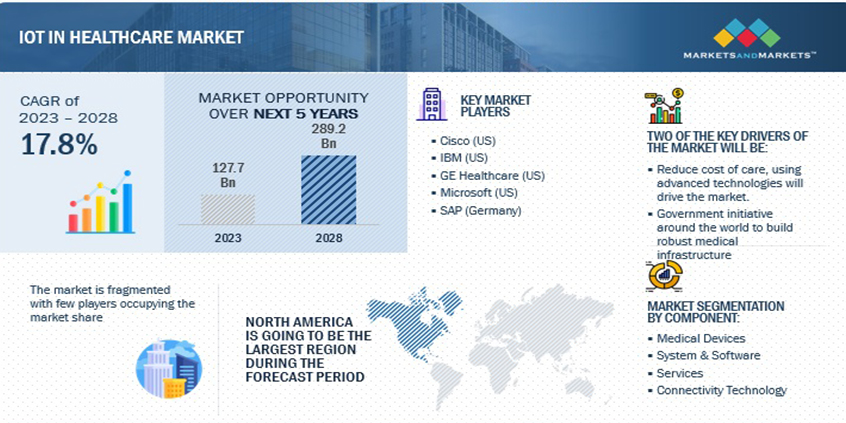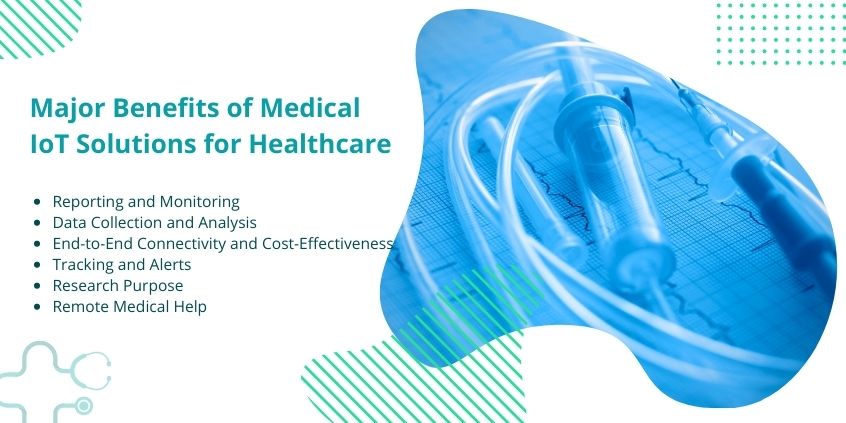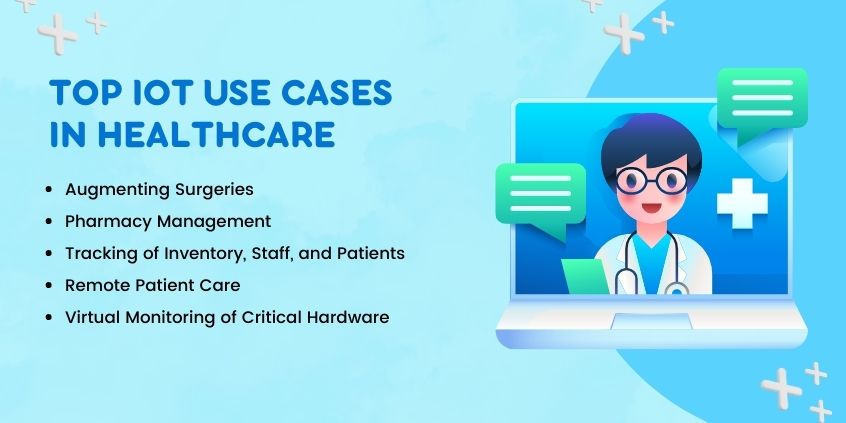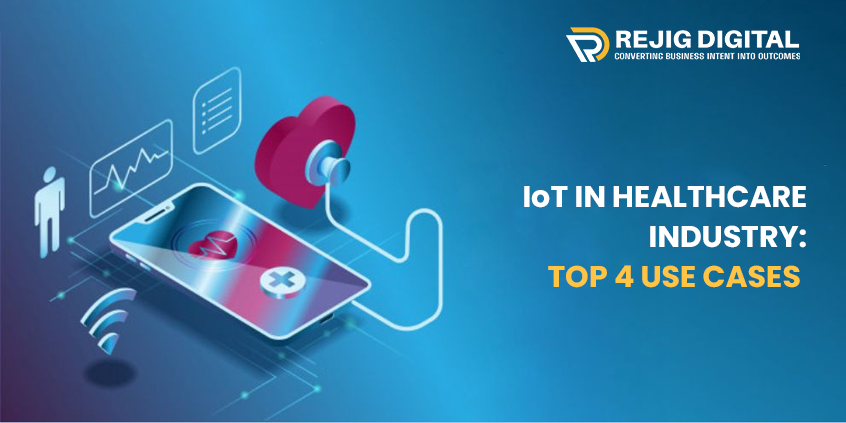The healthcare industry is undergoing a transformation with the advent of IoT which leads to improved health outcomes, smarter hospitals, enhanced efficiency, and increased cost-effectiveness. With the increasing popularity of the Internet of Things, medical IoT solutions are beginning to redefine the healthcare industry.
However, initiating a new era of innovation, IoT applications encompass right from transportation and manufacturing to smart home control and automation, and even entertainment. Hence, the healthcare industry is not behind and embracing the Internet of Things. When it comes to the healthcare industry, IoT technology benefits to a great extent. From drug management to patient monitoring, IoT can be utilized in innumerable ways.
According to Markets and Markets, the global market of IoT in healthcare is expected to increase from USD 127.7 Billion in 2023 to USD 289.2 Billion by 2028 at a CAGR of 17.8%.

Major Benefits of Medical IoT Solutions for Healthcare

With the growing availability of customized medical IoT solutions, the healthcare sector can yield a wide variety of benefits.
Let’s see some of the important benefits of medical IoT solutions.
-
Reporting and Monitoring
Connected devices enable remote health monitoring, which is extremely helpful in medical emergencies such as heart failure, diabetes, and asthma attacks. By utilizing smart medical devices connected to smartphone apps, real-time monitoring of health conditions becomes possible. Such connected medical IoT solutions can collect essential medical and health data.
This IoT-based framework utilizes the data connection of a smartphone to transmit the collected information to either a physician or a cloud platform.
IoT devices play a crucial role in collecting and transferring a broad range of health data, including vital indicators like blood pressure, oxygen levels, blood sugar levels, weight, and ECG recordings.
These collected data are securely stored in the cloud and shared with authorized individuals, such as physicians, insurance companies, participating health-centric organizations, or external consultants. Irrespective of location, time, or device, these authorized individuals can access and review the collected data.
-
Data Collection and Analysis
If access to the cloud is unavailable, it becomes challenging to store and manage the massive amount of data transmitted by healthcare devices in real time. For healthcare professionals, manually collecting and analyzing data from multiple devices and sources is a difficult task.
Therefore, it is crucial to adopt the IoT framework as these connected medical devices have the capability to collect, report, and analyze real-time information, which eliminates the requirement of storing raw data.
These processes can be easily implemented over the cloud which allows healthcare providers to access only the final reports.
Furthermore, healthcare-based operations enable organizations to gain crucial healthcare analytics and data-driven insights which speed up the decision-making process and reduce the likelihood of errors.
-
End-to-End Connectivity and Cost-Effectiveness
The integration of IoT in healthcare industry, with other emerging technologies, can automate patient care workflows and enhance advanced healthcare facilities.
IoT implementation in the healthcare sector enables effective service delivery through features such as interoperability, artificial intelligence, machine-to-machine communication, information exchange, and fast and real-time data movement.
By leveraging connectivity devices such as Bluetooth LE, Wi-Fi, Z-wave, ZigBee, and other modern means, healthcare professionals can transform the way they identify illnesses and ailments in patients. It also opens many innovative approaches to treatment across various healthcare fields.
As a result, a technology-driven healthcare setup can facilitate cost reduction by reducing unnecessary visits, utilizing high-quality resources more efficiently, and enhancing allocation and planning processes.
-
Tracking and Alerts
Timely alerts play an important role in managing chronic conditions. By collecting and transferring vital signs associated with different diseases, medical IoT devices support real-time tracking which provides doctors with up-to-date information.
Simultaneously, they send notifications to individuals through mobile apps and smart sensors, highlighting the critical aspects of health records.
Reports and alerts provide a comprehensive assessment of a patient’s condition irrespective of their location and the time of day. It allows healthcare providers in making informed decisions and delivering prompt treatment.
As a result, IoT enables real-time alerting, tracking, and monitoring, facilitates proactive interventions, improved accuracy, and timely treatments by doctors. Hence, IoT-enabled integrations enhance overall patient care.
-
Research Purpose
IoT applications in healthcare can serve research purposes as well. As IoT can collect vast amounts of data about a patient’s illness, hence it speeds up the research process otherwise it would take many years if done manually.
The collected data can be utilized for statistical studies that support medical research as well as offer valuable insights.
As a result, IoT not only saves time but also reduces costs associated with research endeavours. The impact of IoT in the field of medical research is significant, as it enables the development of more comprehensive and advanced medical treatments.
IoT is integrated into various devices for improving the quality of patient care and hospital functionalities. Even existing devices are being upgraded with IoT capabilities by incorporating smart hospital device chips. These chips improve the assistance and care that patients receive.
-
Remote Medical Help
During emergencies, patients can utilize smart mobile apps to connect with doctors who may be located several kilometres away. IoT-enabled remote solutions enable medical professionals to rapidly assess patients and identify issues even from a distant location.
Moreover, there are various IoT-based healthcare delivery systems that use machines capable of dispensing medication based on the patient’s prescription and ailment-related data obtained from connected healthcare systems.
The implementation of IoT in hospitals will enhance patient care, ultimately reducing healthcare expenses for individuals.
Top IoT Use Cases in Healthcare

IoT for the healthcare industry holds immense potential to improve patient care, enhance operational efficiency, and enable remote monitoring and management of medical devices.
Here are some core use cases of IoT in the healthcare industry.
-
Augmenting Surgeries
IoT is also helpful in surgical operations which further transforms healthcare practices. Connected robotic devices, driven by Artificial Intelligence can implement various surgical procedures. Such technologically advanced operations prioritize enhanced precision through the assistance of robot-assisted surgeons. In addition, the integration of connected devices and IoT applications can effectively streamline the workflow of medical personnel, both before and after surgeries. In both stages, IoT sensors are utilized to collect, transmit, and analyze data which facilitates the recording of even small details. Therefore, IoT contributes to the prevention of surgical complications.
-
Pharmacy Management
The pharmacy industry is a complex domain which involves various processes in the transportation and management of drugs from production plants to hospital storage facilities. Throughout these stages, there are various challenges come up in terms of drug preservation. However, IoT is useful for robust safety measures which result in fast drug delivery, improved operational safety, and enhanced patient care.
For instance, many pharmacy-centric businesses use smart fridges, which are useful for storing vaccines and preventing damage during handling, storage, and transportation.
With the integration of IoT, pharmacies can achieve greater operational efficiencies, error-free medical dispensing, heightened security, and ultimately, an overall improvement in patient satisfaction.
-
Tracking of Inventory, Staff, and Patients
Healthcare organizations strive to enhance workforce efficiency and reduce operational costs. It is also needed by institutions with various staff members, patients, and inventory. By leveraging IoT devices such as wireless ID cards, hospitals can effectively manage admissions, enhance security measures, and evaluate overall staff performance. BLE (Bluetooth Low Energy) beacons and RFID tags are also used to track inventory locations and locate staff members instantly during emergencies.
Furthermore, the combination of IoT and RTLS (Real-Time Location Systems) enables efficient asset tracking. It allows monitoring of equipment, medications, and available resources which frees up valuable time for healthcare providers to focus on patient care.
-
Remote Patient Care
Remote patient care plays a crucial role when residents live distances away from healthcare facilities. As a result, when emergencies arise, it takes significant time for them to reach these facilities. Similarly, healthcare providers face challenges in making frequent visits to patients with chronic conditions. That’s where IoT technology comes into play as it can implement remote monitoring of patients.
Through connectivity, healthcare professionals can remotely assist patients by providing prescriptions, medication guidance, and monitoring their biometrics using sensors and remote equipment. For instance, patients can connect wearable or portable devices to the cloud which generates real-time data updates.
Certain IoT devices also enable face-to-face communication over the Internet, which enables healthcare professionals to collect essential information and prepare care plans effectively. Live video and audio streaming are used to monitor patients’ current condition to eliminate the need for physical travelling to hospitals.
-
Virtual Monitoring of Critical Hardware
Most modern healthcare facilities rely on cutting-edge hardware and software to operate effectively. However, when these components are not properly maintained, they can go through risks and vulnerabilities. Issues such as power outages, system failures, and cyber-attacks can also harm these devices and software. As healthcare organizations always want to prevent such mishaps, IoT-driven solutions are best to enhance safety and security.
Conclusion
The healthcare industry can greatly benefit from the integration of medical IoT solutions. It has the potential to enhance hospital operations, improve patient monitoring, and offer accessible solutions for wearable technology. As IoT devices are susceptible to vulnerabilities, and while patient data and regulatory compliance used to be the primary focus, the potential risks by hackers must also be given due consideration.
Rejig Digital has comprehensive expertise in emerging technology with a goal to digitally transform a wide variety of industries. Hence, our healthcare IoT solutions are also catered to redefine the healthcare industry. For more details, feel free to contact us.



